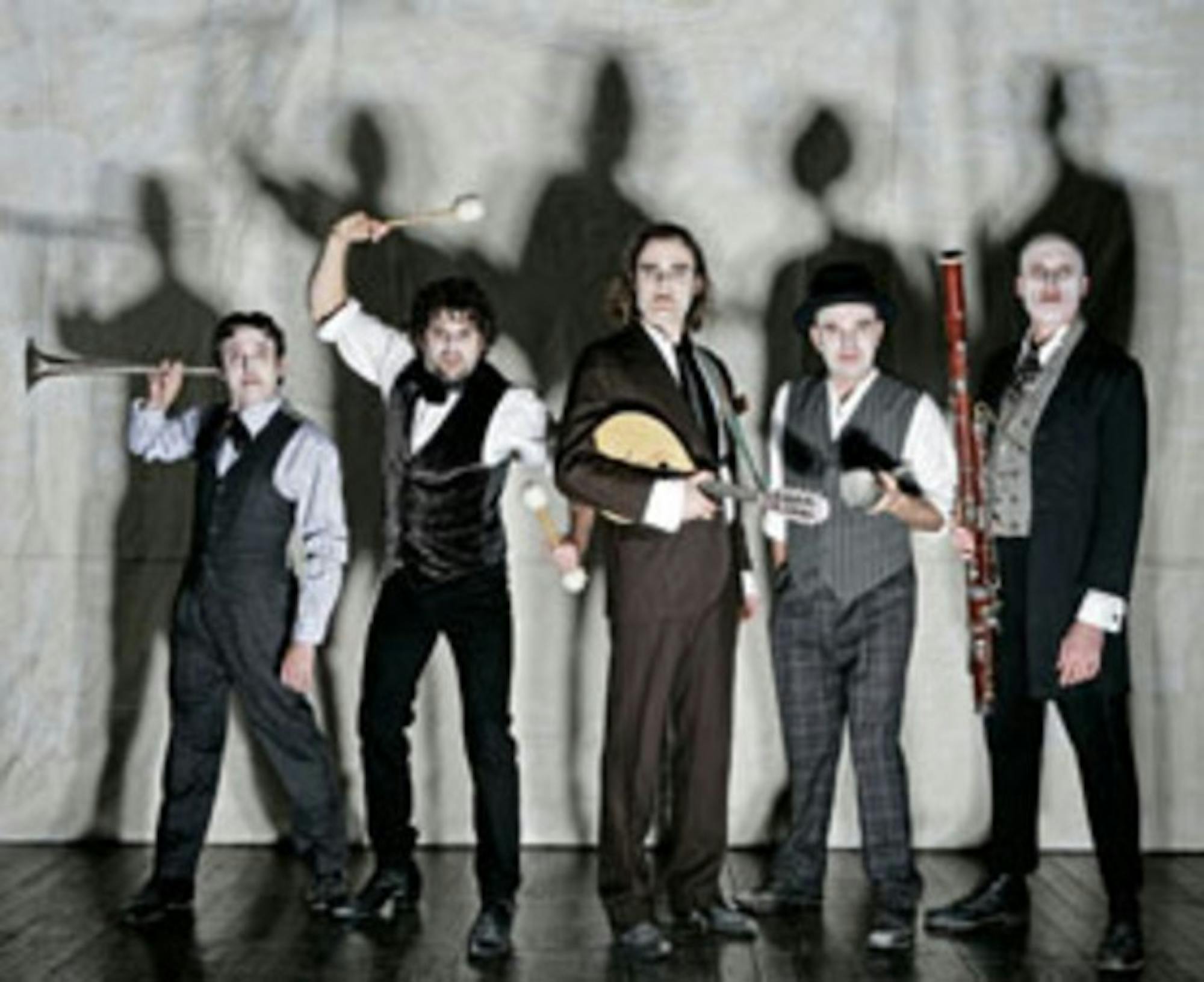Nike uses Morricone's "The Ecstasy of Gold" in a current commercial featuring the Pittsburgh Steelers' Troy Polamalu and the San Diego Chargers' LaDainian Tomlinson, and Metallica has opened its concerts with the song for over 20 years.
Morricone's music inspired the quintet that is now the Spaghetti Western Orchestra, which brings its unusual combination of music, theater and comedy to the Hopkins Center for the Arts tonight for the first time as part of its North American tour.
"This is really a new concert experience. There's nothing like it out there. You arrive and you're automatically thrust into this ambience of being in something unusual," said Denis Blais, director of the Spaghetti Western Orchestra, in an interview with The Dartmouth.
Formed in 2000, the Australian quintet -- Boris Conley, Patrick Cronin, David Hewitt, Graeme Leak and Patrick McLeod -- play 100 instruments ranging from the traditional (claves, bassoon, piano) to the absurd (a deck of cards, a coat hanger and a box of cornflakes).
Together they recreate the booms, bangs and clangs of Morricone's movie soundtracks on stage, animating their performance with dialogue and audience interaction.
Morricone's name is synonymous with the Spaghetti Western genre, which emerged in the mid-1960s. Coined by critics to trivialize new Westerns produced by Italian studios, the term originally carried negative connotations.
All of that changed, however, when Morricone collaborated with director and school friend Sergio Leone. The two became a highly successful director-composer duo after their first big hit, "Per un Pugno di Dollari" ("A Fistful Dollars") was released in 1964.
The film starred Clint Eastwood as the Man with No Name, a rugged gunslinger who lived only to make money. Despite critics' low expectations, it was so popular that is spawned two sequels: "For a Few Dollars More" (1965) and "The Good, the Bad, and the Ugly" (1966). Known collectively as the "Dollars" trilogy, they are arguably the most famous Spaghetti Westerns ever, launching both Leone's and Morricone's careers.
Morricone's musical background was in avant garde jazz and score composition. He mixed the sounds of hoofbeat rhythms, whistling and the human voice with yodeling and gunfire for innovative effects that would become staples of Spaghetti Western music.
"The magic of Morricone," said Blais, "is that his music really transcends all kinds of generations and ages because he taps into everything. You've got classical in his music. You've got jazz in his music. You've even got rock moments. It's beyond what anyone knew at the time."
In 2007, Clint Eastwood presented Morricone with an honorary Academy Award "for his magnificent and multifaceted contributions to the art of film music." He had been nominated for an Oscar five times but had never won.
That same year, the Spaghetti Western Orchestra performed at the Edinburgh Festival, where they caught Denis Blais' attention. Then an interior and architectural designer, Blais had a vision to make over the group and change their performance style.
After the show, Blais talked to the musicians and suggested ways they could improve. The Spaghetti Western Orchestra took his advice and asked him to join as their director.
Blais added a musical narrative to integrate their repertoire and assigned a character to each member. Now the five performers, wearing white makeup and black and white costumes, represent film extras who have come back to haunt the director who killed them off early in a fictional film.
"The musicians take on the personae of newly arrived immigrants who landed there in the middle of nowhere. What you get is these extremely funny moments, awkward moments and very serious moments, too, all in one show," Blais said.
In remodeling the orchestra's aesthetic, Blais added light and color to the stage to give it a cinematic feel while still keeping the focus on the music.
"I wanted to remain pure to the essence of the show, which was the music," Blais said, "and I thought that should be the set design. It's a very subtle but very dynamic show to see."
Blais' new ideas were a success when the orchestra's debut at the 2007 Montreal Jazz Festival sold out. The group went on to Paris and Toronto before beginning to tour in the States.
In performance they play 18 Morricone compositions while reenacting typical Spaghetti Western dialogue and engaging the audience members as "extras," asking them to produce background sound effects.
"What we do is we push the imagination of the audience," Blais said. "We play the role of Ennio Morricone, and the audience plays the role of Sergio Leone. It's almost as if you're filming this movie with us."
The Spaghetti Western Orchestra performs tonight at 7 p.m., in Spaulding Auditorium at the Hopkins Center.




